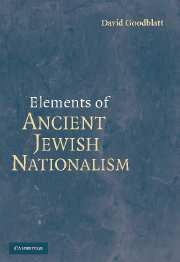Book contents
- Frontmatter
- Contents
- List of Abbreviations
- Preface
- 1 Theoretical Considerations: Nationalism and Ethnicity in Antiquity
- 2 Constructing Jewish Nationalism: The Role of Scripture
- 3 Constructing Jewish Nationalism: The Hebrew Language
- 4 A Kingdom of Priests: The Priestly Component in Ancient Jewish Nationalism
- 5 Israel Nationalism
- 6 Judah Nationalism
- 7 Zion Nationalism
- 8 Conclusions: Jewish Nationalism – What Rose and What Fell?
- Bibliography
- Author Index
- Index
4 - A Kingdom of Priests: The Priestly Component in Ancient Jewish Nationalism
Published online by Cambridge University Press: 20 July 2009
- Frontmatter
- Contents
- List of Abbreviations
- Preface
- 1 Theoretical Considerations: Nationalism and Ethnicity in Antiquity
- 2 Constructing Jewish Nationalism: The Role of Scripture
- 3 Constructing Jewish Nationalism: The Hebrew Language
- 4 A Kingdom of Priests: The Priestly Component in Ancient Jewish Nationalism
- 5 Israel Nationalism
- 6 Judah Nationalism
- 7 Zion Nationalism
- 8 Conclusions: Jewish Nationalism – What Rose and What Fell?
- Bibliography
- Author Index
- Index
Summary
The title of this chapter comes from the famous verse at Exodus 19:6. That verse appears in the preliminaries leading up to the theophany at Mount Sinai. When the Israelites arrive at the wilderness of Sinai, Yahweh gives Moses a message to deliver to them. I shall quote the passage (Verses 3b–6) in the fairly literal translation of the Revised Standard Version.
Thus shall you say to the house of Jacob and tell the people of Israel. You have seen what I did to the Egyptians, and how I bore you on eagles' wings and brought you to myself. Now therefore, if you will obey my voice and keep my covenant, you shall be my own possession [segullah] among all the peoples; for all the earth is mine, and you shall be to me a kingdom of priests and a holy nation [mamlekhet kohanim vegoy qadosh]. These are the words which you shall speak to the children of Israel.
Of interest to us here is how later readers and hearers understood Verse 6. In Chapter 1 I mentioned the Bible's use of the word “goy” to refer to Israel as well as to other nations. Our passage explains how the Israelite nation will differ from those others as a result of its special relationship with Yahweh. It will be “holy” and “a kingdom of priests.” It is this last phrase that intrigues me, just as it has exercised exegetes.
The original meaning of the passage is not our concern.
- Type
- Chapter
- Information
- Elements of Ancient Jewish Nationalism , pp. 71 - 107Publisher: Cambridge University PressPrint publication year: 2006

